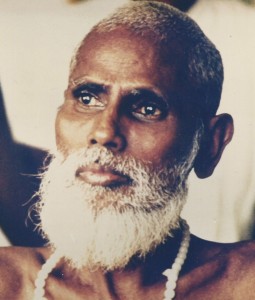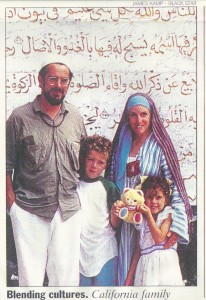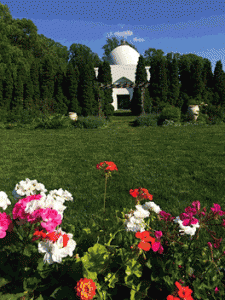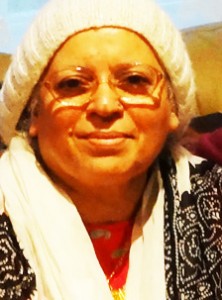
Nahnu Fee Rawdati & Poem: Shy Hemlocks Brash Niagaras
The song, Nahnu fee Rawdati, from the Diwan of Shaykh ibn al-Habib, raheemahullah, s…


In the late 70s, Bawa came to San Francisco, and a small group of us put on our green turbans, tasbihs and long shirts and scarves and went to see him from our Shadhili-Habibiyya Zawiyya in Berkeley.
It was a huge warehouse kind of building, and a large crowd stood or sat on the floor, as Bawa, in a far corner, was finishing a discourse in Tamil, with a soft-voiced woman translator. He was a Sri Lankan shahykh, quite different to us from our Moroccan teacher, and its very classical Arabic traditions. Bawa was a lone wali, cosmologically inspired in the grand tradition of saints from everywhere. He spoke in rolling musical words that spilled out of him as the translator, much more slowly, somehow kept up with him, speaking just as he finished one sentence and rivered on to a next.
Afterwards, he came down from his seat and moved through the crowd, hugging and greeting people, and when he came a few yards from us, the crowd opened and he looked at us very directly, bowing slightly, before the crowd closed up around him again.
He not only established a spiritual center that continues and thrives today at a quiet edge of the city of Philadelphia, but also one of the most beautiful independent Mosques, the Bawa Muhaiyaddeen Mosque, before whose spectacular facade we happened to be photographed on one of our visits before we moved, and that later appeared in an article on American Islam in the U.S News & World Report.

It wasn’t until 1990, when we moved to Philadelphia to become affiliated with the Bawa Fellowship — many children our children’s age, many devotees our age, and a strong resonant connection — that his glance became realized in us (and the glance of a wali is well-known for its blessed consequences). A longtime friend, a co-director of my Floating Lotus Opera Company, then Zilla, now Shaykha Maryam Kabeer, author of her spiritual autobiography Through Ten-Thousand Veils, was also a longtime devotee of Bawa, and had lived in the community for years, and was married to one of its imams, former Serendip pearl fisherman, Sidi Ahamed Kabeer.
Bawa was so drowned in knowledge, so engulfed in Allah’s Light, drunk/sober, sober/drunk, yet natural and truly dwelling among his mostly American disciples, in absolute generosity, part of Allah’s ongoing cascade, that he transformed many from their sometimes over-dazzled 60s days and nights — a simple (and in no way simple) ascetic saint from the ancient forest teachings of a deeply inner Islam.
He died at his Fellowship Center in Philadelphia, and is buried in a light-filled Mazar, out in flowing Fallowfield green (or snow-packed) Pennsylvania country, about half-an-hour drive from Philadelphia. It’s a strong galactic light to which people from many miles come to pray and bathe.
“The things that change are not our real life.
Within us there is another body, another beauty.
It belongs to that ray of Light which never changes.
We must discover how to mingle with It
and become onewith that Unchanging thing.
We must realize and understand this treasure of Truth.
That is why we have come to the world.
Within your heart in a space no bigger than an atom,
God has placed the 18,000 universes.”
“There is One God.
He created all beings,
And He exists beyond the beyond of religions,
Beyond the separations of race,
Religion, and philosophies.
He is beyond mind, desire, and physical vision
He is beyond the world, lust, torpor, and illusion.
God resides in that spotlessly pure place known as the heart
And sees and knows everything.
He sees each and every heart and mind
and understands all things.”
The Fellowship graveyard sits serenely on one of its sloping green hills. A nice spot to go.

We also join the dhikrs of one of Bawa’s most ardent devotees, Baji Tayyiba Khanum, from Pakistan, whose family living here in America were with the Fellowship for many years before Baji came seeking refuge in 2004. Baji’s Pashtun shaykh instilled in her a light of pure knowledge of Tawheed, the Unity of Allah for everything — everything… She is often a guide at the Mazar of Bawa to the droves of Pakistanis and Gujuratis who make pilgrimage there, able to speak their language, and cook their food.

See citation for Bawa Muhaiyaddeen on Wikipedia
Categories: Spiritual Teachers